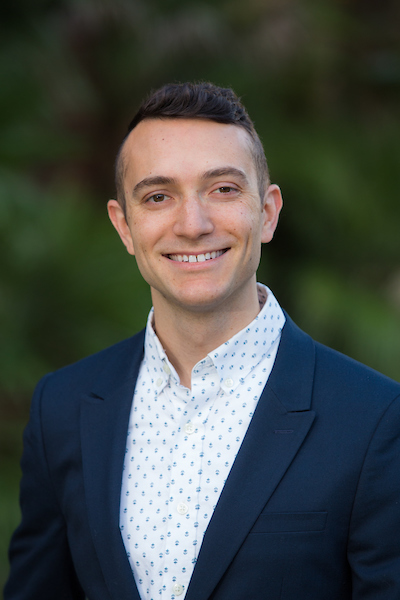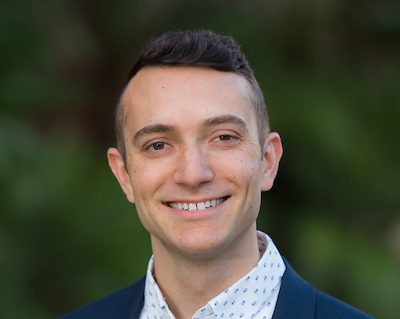
Dr. Ryan Need
Spotlight on Dr. Ryan Need (they/them)
We recently had the opportunity to speak with Dr. Ryan Need, assistant professor in the Department of Materials Science and Engineering (MSE).
Q: Dr. Need, first, welcome as a relatively new faculty member at the Herbert Wertheim College of Engineering. Can you tell us about your experience as a new faculty member at UF, in particular, during such a strange and difficult year?
A: I arrived on the UF campus in February of 2020. We were in the process of retrofitting equipment for my lab, and my grad students and I were designing an additional apparatus to build on top of what is already in place for our work in quantum materials. We had just begun this process when COVID-19 came along and everyone had to leave their labs. It was very challenging to find other work for the students to do outside the lab, because my research is based on experimentation and use of specialized vacuum equipment. But, I think the biggest hurdle for me was not being able to establish connections in the community. Without the ability to organically bump into colleagues in other departments, it made the campus experience a bit different. I don’t feel settled yet. I’m looking forward to having more of those interactions with my peers and students and building collegial relationships.
Q: As the team leader of the Quantum Materials Design Group within MSE, you are working on some cutting edge research in the field of computing. How did you become interested in this area of research?
A: Quantum materials possess unique behaviors or properties, such as magnetism or superconductivity, which cannot be explained without referring to quantum mechanics. When I was thinking as a postdoc about what I wanted to do in my career, I came across a great planning exercise that asked four questions:
- What do you like to do? (Enjoyment)
- What are you good at doing? (Expertise)
- What can you make money doing? (Support)
- What does the world need that you can do? (Contribution)
For me, the intersection for these questions was teaching. However, my research experiences and expertise lies in growing very perfect little crystals, where we can apply mathematics to predict their quantum properties. What we try to do in the Quantum Materials Design Group is to create new quantum materials then leverage their useful properties to build more energy-efficient electronic devices. This includes new kinds of transistors and computer memory for traditional computers, as well building blocks for new computing methods like quantum computing. If we are going to continue improving our electronics, we need new materials and outside-the-box thinking. We have to go back to the drawing board. Quantum materials that offer a new path to safer, more efficient, cost-effective electronics. I find this field of research very exciting, and my expertise lends itself to helping meet this technological need.
Q: How did the COVID-19 pandemic affect your research and teaching during the past year?
A: The equipment my team and I were building for our lab is quite large and heavy, and it requires several people working together to assemble the pieces. When COVID-19 sent everyone home, we had to stop that work. Once we were able to get back into our labs, things progress slowly because social distancing made equipment assembly difficult; but now we are getting on track.
It was very important to me to keep my research team engaged and investigating quantum materials. For most of 2020, students assisting with my research were focused on analyzing data I had created in previous experiments. We met via zoom to discuss the results, which we will be publishing later this year.
One of my biggest challenges during the past year was to keep my students busy and engaged in order to keep up their morale and promote mental health. I think we were able to do that despite the sense of isolation everyone felt due to the inability to benefit from group support.
I was scheduled to teach only one class this past year, and I adapted to teaching it via zoom. The class is also part of our EDGE (Electronic Delivery of Gator Engineering) program, so it had to be taught online. This fall I am still going to give my lectures online, and I’m going to flip my classroom and do activity-based learning during in-person classes.
Q: We understand that you are a member of the MSE IDEA (Inclusion, Diversity, Equity and Access) coalition and that you have a strong commitment to its vision and to the LGBTQ+ community. Can you tell us about your involvement in Queer Nation, the UF LGBTQ+ faculty/staff group on campus?
A: There are many opportunities to get involved in the LGBTQ+ community here at UF, and this was one way I could continue to build community, even during the isolation of COVID. I work with the MSE IDEA coalition, where my main activity has been establishing regular communications on behalf of the coalition. We are responding to recent events, and we’re also trying to bridge cultural gaps by highlighting commemorative events each month. Staff and students have joined faculty in developing a department culture that is representative of our entire community. This has offered me the opportunity to mentor various students to develop cultural awareness. We have also put together an action item list to guide us in identifying diversity issues and measuring our progress in addressing them. Our work so far is being recognized inside and outside of our department, and now we are helping others develop our model for their own departments.
Two other committees I am involved with are LPAC (Presidential LGBTQ+ Advisory Committee) and Queer Nation. LPAC involves students and faculty in political action activities that improve diversity, inclusion, equity and access. Queer Nation was born out of LPAC by members who wanted to develop a social arm to build a community and visibility around LGBTQ+ activities here on campus.
Q: Mentoring students who are members of the LGBTQ+ community helps create inclusion as well as leads to greater educational success. Can you tell us how you feel your role as a mentor helps students?
A: I work with the leaders of the UF’s chapter of oSTEM (Out in Science, Technology, Engineering & Mathematics) and one of its subcommittees, Pride in Engineering (PIE) to help plan events and organize goals for the various LGBTQ+ organizations. We are addressing issues such as bringing LGBTQ+ scientists and engineers to campus as part of speaker programs and creating safe spaces to discuss the difficulties of LGBTQ+ students in STEM environments. We want to expand on what other groups at UF are doing, to bring cohesion to the different groups on campus. LGBTQ+ Affairs on campus is working hard on creating safe spaces for discussion, so during the next year we are going to focus on bringing in speakers to help introduce LGBTQ+ students to role models in science and engineering.
Q: Is there something that we didn’t cover that you would like to bring more awareness to? Such as any opportunities to get involved or participate – either as a faculty/staff or student.
A: This past year I participated in the University Minority Mentoring Program and had a fantastic experience. I had the opportunity to mentor an LGBTQ+ student, and the experience was so positive that I am continuing to mentor the student after the program ended.
As we continue to guide the various LGBTQ+ organizations on campus, we are trying to help them update their websites and make it easier to find and make connections.
Being a part of LGBTQ+ organizations helps increase awareness and inclusion on campus. If any students are interested in joining LPAC, applications are being accepted until July 2. They can go to the Student Affairs section of the university web site to find out more about the committee and apply.
The Lavender Living Learning Community affinity housing has been approved by UF, and this year they will be hosting their first cohort of students at the Springs Complex. The integration of social and enrichment programs at Lavender LLC will offer students opportunities to build a support network while at the university.
If any students have difficulties finding the sites or locating people, they can email me at rneed@ufl.edu and I will point them in the right direction.
